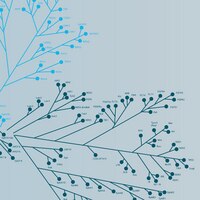Anaplastic lymphoma kinase proteins in growth control and cancer.
Pulford, K, et al.
J. Cell. Physiol., 199: 330-58 (2004)
2004
요약 표시
The normal functions of full-length anaplastic lymphoma kinase (ALK) remain to be completely elucidated. Although considered to be important in neural development, recent studies in Drosophila also highlight a role for ALK in gut muscle differentiation. Indeed, the Drosophila model offers a future arena for the study of ALK, its ligands and signalling cascades. The discovery of activated fusion forms of the ALK tyrosine kinase in anaplastic large cell lymphoma (ALCL) has dramatically improved our understanding of the pathogenesis of these lymphomas and enhanced the pathological diagnosis of this subtype of non-Hodgkin's lymphoma (NHL). Likewise, the realisation that a high percentage of inflammatory myofibroblastic tumours express activated-ALK fusion proteins has clarified the causation of these mesenchymal neoplasms and provided for their easier discrimination from other mesenchymal-derived inflammatory myofibroblastic tumour (IMT) mimics. Recent reports of ALK expression in a range of carcinoma-derived cell lines together with its apparent role as a receptor for PTN and MK, both of which have been implicated in tumourigenesis, raise the possibility that ALK-mediated signalling could play a role in the development and/or progression of a number of common solid tumours. The therapeutic targeting of ALK may prove to have efficacy in the treatment of many of these neoplasms. | 15095281
 |
The emerging normal and disease-related roles of anaplastic lymphoma kinase.
Pulford, K, et al.
Cell. Mol. Life Sci., 61: 2939-53 (2004)
2004
요약 표시
Anaplastic lymphoma kinase (ALK) is a receptor tyrosine kinase, the normal role of which remains to be completely elucidated. Although work carried out in mammals suggests a function in neural development, results from studies in Drosophila indicate an additional role in visceral muscle differentiation. The aberrant expression of full-length ALK receptor proteins has been reported in neuroblastomas and glioblastomas, while the occurrence of ALK fusion proteins in anaplastic large cell lymphoma (ALCL) has resulted in the identification of the new tumor entity, ALK-positive ALCL. ALK represents one of few examples of a receptor tyrosine kinase implicated in oncogenesis in both haematopoietic and non-haematopoietic tumors, given that ALK fusions also occur in the mesenchymal tumor known as inflammatory myofibroblastic tumor (IMT). The study of ALK fusion proteins, besides demonstrating their importance in tumor development, has also raised the possibility of new therapeutic treatments for patients with ALK-positive malignancies. | 15583856
 |
ALK a novel lymphoma-associated tumor antigen for vaccination strategies.
Passoni, Lorena and Gambacorti-Passerini, Carlo
Leuk. Lymphoma, 44: 1675-81 (2003)
2003
요약 표시
The discovery of Tumor Associated Antigens (TAAs) demonstrated that tumor cells can be specifically recognized by the immune system raising the hypothesis that tumors express antigens that Cytotoxic T Lymphocytes (CTLs) can potentially attack. The identification of immunogenic epitopes led to their use as targets to mediate the specific clearance of neoplastic cells by TAA targeting strategies such as vaccination strategies. One of the critical issues in the development of efficient vaccination protocols is the identification of the appropriate TAAs. The TAA should be effective as a "tumor rejection antigen" able to induce an immune response that will affect tumor growth. A distinct pathologic entity characterized by the expression of the Anaplastic Lymphoma Kinase (ALK) protein and named "ALKoma" has recently emerged within the heterogeneous group of CD30+ Anaplastic Large Cell Lymphoma (ALCL). ALK is a receptor tyrosine kinase whose expression is normally restricted to a few scattered cells in the nervous system. Its pathological expression in lymphoma cells is due to a chromosomal translocation that leads to the formation of an ALK-derived oncogenic fusion proteins. ALK fusion proteins ectopically over-expressed and constitutively activated in lymphoid cells play a key role in the neoplastic transformation by the aberrant phosphorylation of intracellular substrates that likely contributes to the molecular pathogenesis of ALCL. The high level of ALK expression in lymphoma cells and its direct role in lymphomagenesis, combined with the fact that normal ALK is expressed at low levels in the immune privileged nervous system, makes ALK an ideal lymphoma-specific target for immunotherapy of ALK+ALCL. | 14692518
 |
Expression of anaplastic lymphoma kinase in non-Hodgkin's lymphomas and other malignant neoplasms. Biological, diagnostic, and clinical implications.
Wasik, Mariusz A
Am. J. Clin. Pathol., 118 Suppl: S81-92 (2002)
2002
요약 표시
Accumulating evidence indicates that expression of anaplastic lymphoma kinase (ALK), typically due to t(2;5) translocation that creates an NPM-ALK fusion gene, defines a distinct type of T/null-cell lymphoma (TCL) within a vastly heterogeneous group of anaplastic large cell lymphomas. Through the translocation mechanism or as a full-length apparently intact protein, ALK also is expressed by a subset of inflammatory myofibroblastic tumors, glioblastomas, diffuse large B-cell lymphomas, and other malignant neoplasms. Owing to the recent progress in understanding its pathogenesis, ALK+ TCL has become a model malignant neoplasm in which morphology-based diagnosis and classification are gradually shifting toward biology-based diagnosis. Several lines of experimental evidence indicate that the ectopically expressed ALK is oncogenic in ALK+ TCL by being constitutively active owing to autophosphorylation and, consequently, by stimulating several critical signal transduction pathways involving phospholipase C-gamma, AKT, and STAT3 (signal transducer and activator of transcription 3). Targeting ALK and, perhaps, its downstream signaling effector proteins represents a promising novel therapeutic approach to ALK+ TCL. Diagnostic implications of the ALK expression in ALK+ TCL and other malignant neoplasms and the related current controversies are discussed. | 14569815
 |


















